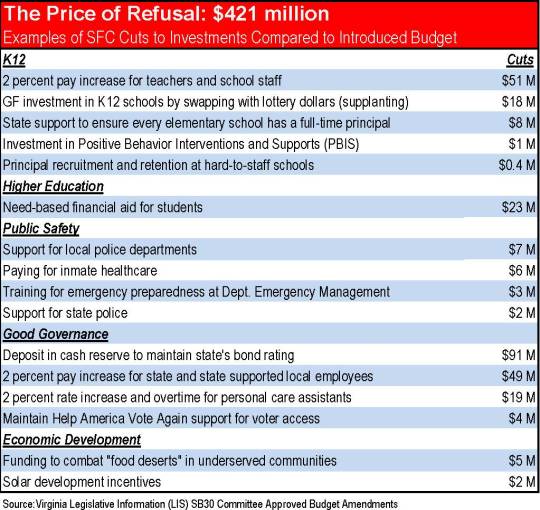February 22, 2018
The Price of Turning Down Health Insurance for Hundreds of Thousands of Virginians
This past Sunday the House and Senate money committees put forward their proposals for the state’s next two-year budget – amending what former Governor McAuliffe proposed this past December. And what a stark contrast they offer: House Appropriations invests hundreds of millions of dollars to improve vital public services with funds from accepting federal funds to expand health care coverage to thousands of Virginians, while the Senate Finance Committee proposes deep cuts to the introduced budget.
The House Appropriations proposal maintains or increases widespread investments in vital public services, including need-based financial aid for students; pay increases for teachers, school staff, and state workers; investments in K-12 schools and higher education institutions; more access to mental health services; and expanded health care coverage to hundreds of thousands of Virginians.
The Senate Finance proposal makes dramatic reductions in state investments compared to the introduced budget. The Senate proposal eliminates pay increases for teachers, school staff, and state workers; cuts new financial aid investments in half; provides less support for mental health services; reduces support for state and local police, and does not expand health care coverage to thousands of Virginians.

Accepting federal resources to expand Virginia’s Medicaid program makes a dramatic difference on state fiscal resources. By pairing expansion with a provider assessment on private acute care hospitals, the introduced budget would save the state over $420 million. The House Appropriations Committee takes a similar approach, but assumes a later start date for expansion and requires the state to submit a waiver to the U.S. Centers for Medicare & Medicaid Services to implement work requirements and other changes to the Medicaid program. The House estimates $370 million in savings with the delayed start and a cost of $21.5 million to administer work requirements. Yet, this still leaves a substantial amount of savings for state lawmakers to invest.
As lawmakers continue their conversations on the budget, it is important to find a solution that both increases access to health care coverage and makes needed investments in our schools, higher education institutions, law enforcement, and communities.
Category:
Budget & Revenue
